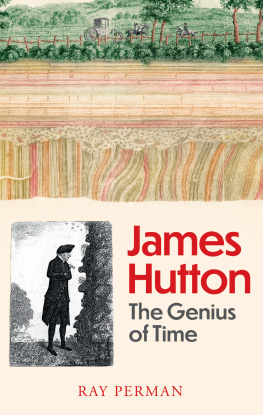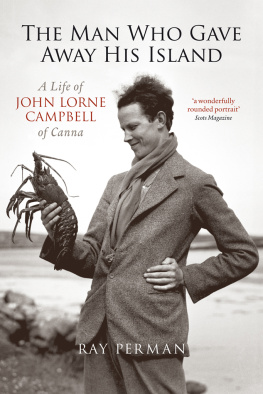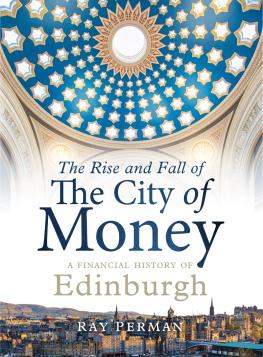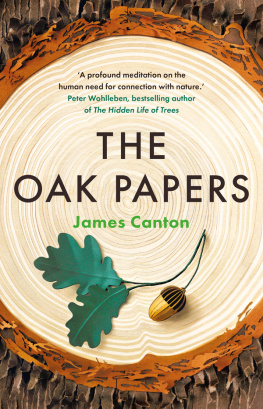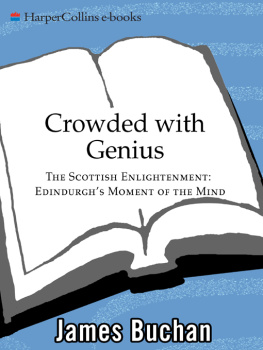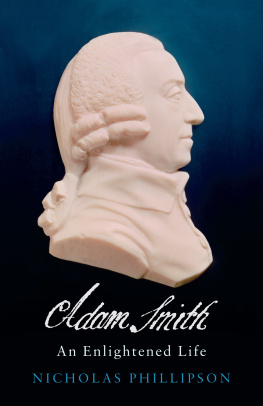Contents
Guide
JAMES HUTTON
THE GENIUS OF TIME
First published in 2022 by
Birlinn Ltd
West Newington House
10 Newington Road Edinburgh
EH9 1QS
www.birlinn.co.uk
Copyright Ray Perman 2022
ISBN 978 1 78885 524 2
The right of Ray Perman to be identified as Author of this work has been asserted by him in accordance with the Copyright, Designs and Patents Act 1988.
All rights reserved. No part of this publication may be reproduced, stored, or transmitted in any form, or by any means, electronic, mechanical or photocopying, recording or otherwise, without the express written permission of the publisher.
British Library Cataloguing in Publication Data
A catalogue record for this book is available from the British Library.
Typeset by Hewer Text UK Ltd, Edinburgh
Printed and bound by Clays Ltd, Elcograf S.p.A
Contents
Preface
JAMES HUTTONS ABILITY to step outside the constraints of time enabled him to change our thinking with his revolutionary Theory of the Earth. His rejection of the biblical narrative, which held the Earth to be little over 6,000 years old, led him to be attacked and his concept of infinite time described as an abyss, a cold, dark, Godless void. But looking into the chasm held no terror for him. He saw clearly a simple and repeated pattern of destruction and renewal, which had shaped the surface of the world over unimaginable ages and continued to do so.
Hutton could read a stone like a book. A cliff face was a library, and as he and two friends gazed on Siccar Point, in Berwickshire on the east coast of Scotland on a calm spring day in 1788, he was able to transport them back to tell them the story of the globe in the simplest language. The mind seemed to grow giddy by looking so far into the abyss of time, one of them remembered, and while we listened with earnestness and admiration to the philosopher who was now unfolding to us the order and series of these wonderful events, we became sensible how much farther reason may sometimes go than imagination can venture to follow.
There are already at least five biographies of Hutton, beginning in 1805 with an account of his life and works by John Playfair, one of the two friends who was with him and looked in wonder at the rock strata. Playfair knew him and became a disciple, yet despite his account Hutton remains an enigma. The Theory of the Earth arguably changed our thinking as much as the books of his contemporaries Adam Smith and David Hume, but he remains much less known than they are. There are big gaps in his life story, important periods when we have no direct evidence of what he was doing. Apart from his published works we have very few of his own papers a handful of letters either to him or from him to others, no diaries or journals, no books of accounts, not even a will.
Playfair tells us that he wrote a great deal and has left behind him an incredible quantity of manuscript. Yet very little of this has survived and the fate of the rest is a mystery. Several scholars have searched in the hope of finding a vast cache of Hutton papers in some dusty attic, but in vain. We also know that he was a voracious reader, yet his library also disappeared and with it clues to some of the scientists, explorers and theorists who might have influenced him. We have more of an idea about what happened to his extensive collection of rocks and fossils, but it too has become so dispersed that it is impossible now to say with certainty that any sample now in a museum or collection once belonged to him.
The picture of Hutton I have tried to paint has been based on as much evidence as I can find of what he was doing and what he was thinking, but I have worked under two handicaps: the first is the lack of documentary evidence mentioned above. Where I have had to assume actions or to interpolate to fill the gaps between known facts, I have tried to make this explicit in the text. The other hindrance was the global coronavirus pandemic, which began in 2020 and closed libraries and archives, particularly those in Edinburgh, London and Paris. I am grateful to those librarians and archivists who, although often working from home, tried to help with my inquiries nonetheless. My appreciation too to Sir Robert Clerk for permission to quote from the Clerks of Penicuik archives.
My special thanks to Ian Robertson, whose written and telephone French is far superior to mine, and who spent many lockdown hours chasing leads and suggesting new directions for research. He also read and made many helpful comments on the whole manuscript. Professor Stuart Monro provided geological knowledge which I lacked and also made perceptive comments on the draft book. Professor Alan Werritty, who at the time of writing, was preparing Huttons unpublished manuscript on agriculture for publication, drew my attention to important aspects which I had missed and made helpful comments on other aspects of his life. I am grateful to Jeanne Donovan for sharing her research on Huttons family. My wife, Fay Young, has put up with James Hutton as a lodger in our house for the past two years and tolerated my amateur attempts to point out unconformities during our country walks. Finally, I owe a debt to all the staff of the James Hutton Institute, which I had the privilege of chairing for six years, for opening my eyes to the genius of Hutton himself.
Ray Perman
Edinburgh, July 2022
Chapter 1
He cared more about fossils...
TO HIS CLOSEST friends James Hutton was a lifelong bachelor, but when he died they realised they had not known him as well as they thought. The news of his death was given to the steam engine builder James Watt by the physicist and mathematician John Robison. Overcome with grief, it was nearly three months before Joseph Black, who had been closest to Hutton and frequently at his bedside during his final illness, could bring himself to write to Watt, and when he did it was to reveal a shock. Shortly after Huttons death on 26 March 1797, a man had arrived in Edinburgh claiming to be his son. He was also called James, and Black guessed him to be about 50 years old. He had lived for most of his life in London where he was a clerk in the Post Office, but poor health had obliged him to seek leave of absence and move to the village of Flimby, near Workington in west Cumbria, where one of his sons was apprenticed to a doctor.
The tone of the letter makes it clear that Black and Watt, two of Huttons most intimate confidents for more than 20 years had no idea he had a son or that he had ever had a relationship. Although he enjoyed the company of women, he was or at least appeared to be unmarried and shared his house in St Johns Hill, Edinburgh, with his older sister, Isabella. The man professing to be his son could easily have been taken for a charlatan out to claim a share of Huttons fortune, but Black was convinced he was genuine.
I have conceived a warm affection for this poor man, he is not unlike the doctormost worthy modest man, of great assiduity and ability in business but has been so much confined as to be but little acquainted with the tricks of this world.
The younger Hutton was married with four sons and three daughters, one of whom he brought with him from Cumbria to Edinburgh to be his nurse and companion. Black thought her well educated and was so taken with the newly discovered Hutton family that he later arranged for the son who wished to be a doctor to study at Edinburgh University and for another son to become an apprentice to Watts steam engine business in Birmingham. The younger James Hutton died in 1802, five years after his father, but his children were accepted and absorbed into the family. They were treated kindly by Huttons friends, Isabella supported them financially, and when she died left them two farms the family owned. But if James Hutton senior was their grandfather, who was their grandmother and why did Hutton keep her identity and their existence a secret even from his closest companions for nearly 50 years?

